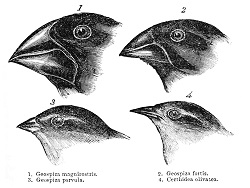|
TRANSLATE THIS ARTICLE
Integral World: Exploring Theories of Everything
An independent forum for a critical discussion of the integral philosophy of Ken Wilber
SEE MORE ESSAYS WRITTEN BY FRANK VISSER
Ken Wilber on the
Power behind Evolution
Casting Doubt on the Contributions of Neo-Darwinism
Is a Dishonest Creationist Strategy
Frank Visser
Ken Wilber makes a huge cosmic assumption to explain local phenomena, where local explanations are much more economical—and believable.
Recently I have come under attack for "misunderstanding" Ken Wilber's views on evolution, most notably by Brad Reynolds in his three-part series "Real Integral vs. Fake Integral". The major complaint is that I have created a strawman out of some "obscure" or "inferior quotes" taken from Wilber, to the effect that there is a Power (Eros) behind evolution that explains its apparent upward thrust—a claim I consider neither credible nor necessary to explain the complexity and diversity we see around us in nature and the cosmos at large. Another objection was that I had overlooked that Wilber's use of the term "evolution" is not strictly limited to the biosphere, but applies to all of reality. One of the strongest quotes in that direction I had taken from an online video called "Taking Evolution into Account":
This seems to be the general overall thrust of evolution—and one of the things that is certain about it, is that it won't give up. It simply is there, with an extraordinary power, in the entire cosmos.[1]
The issue here is that Wilber's written statements in books are much more polished and diplomatic compared to his utterances made in a more personal setting. For this very same reason, I consider these personal statements to reflect his deepest views more closely.
To demonstrate that quotes like this, which are taken from recorded talks and published on Integrallife.com, are not occasional off-the-record speculations or emotional outbursts, but form part of a well-reasoned and consistently over almost four decades argued view of cosmic reality by Wilber, I'd like to return to that video and listen more carefully to what Wilber has to say about evolution. It may be true that Wilber uses the term "evolution" more loosely, but before this wider application can be considered, we need to investigate how well he understands it when applied to its proper domain of biology. It will become clear that he presents his view of evolution as an alternative to science even in the biological realm.
‘TAKING EVOLUTION INTO ACCOUNT’
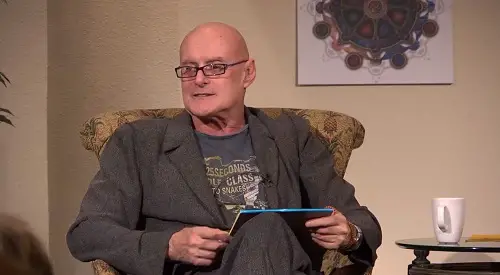
Ken Wilber: “The more you look at the mere neo-Darwinian synthesis, the more absolutely inadequate it becomes to account for evolution.”
After having made some introductory remarks on evolution as a Spirit-driven process, he gets down to the details of natural selection and its reach. Bear with me, but I give you the full transcript here, so you can judge for yourself in what sense I have misunderstood Wilber:
We can think of this as "Spirit-in-action", if we wish we can think of this as "Evolution-in-action", as long as the evolution is updated, from the mere neo-Darwinian synthesis, which the more you look at that, the more absolutely inadequate it becomes to account for evolution.
One quick example. The standard talk is of mutations occurring, in humans or any other life, genetic material, and then this, apparently, has some capacity to help an organism survive, in the overall, generalized, "survival of the fittest". But in order for that to happen, a couple of almost impossible things have to happen.
One, to get from one species to the next, you have to have mutations occurring, anywhere from six to eight. Almost all mutations are lethal. So we are going to have this extraordinary capacity of six to eight mutations occurring, none of them lethal. They are drawing together to create some kind of organic system, that is going to give, whoever inherits that, a major advantage in survival of the fittest.
So we have these extremely improbably genes, all coming together, at the same time, that will also include all of the improvements that are going to increase average survival and advantage of the fittest, and in fact none of them have actually been checked out. So they are coming together, still in some random kind of fashion, and it is sort of said that when they are passed on, they are going to do much, much better, in the competition, for survival.
So how those are actually known to do that, how these six mutations are, unbelievably, going to produce something that is going to make a subsequent organism just incredibly more survival capable... that is not explained.
If you look at something like the immune system, with hundreds of components, and it was supposed to come into existence more or less at the same time, all at once, but none of those components has yet been checked! So how do we know, that all hundred of these things, are going to automatically work together, without ever having done so before, to create an immune system that is going to take care of this organism.
That is really stretching the belief that that could occur. That's just the beginning. Those hundred things that are going to get together in one organism—the male—the number of hundred random mutations have to come together in the female! She's in Mexico, he's in Siberia [audience starts laughing]. Somehow they have got to find eachother... a little dinner.... some flowers... a little candy... and they have sex.
And all of these marvelous, outrageously impossible things have to come together and then their offspring, is like some kind of super-offspring, that has all these things in place, and then we have to make sure that they grow up and, you know, don't get eaten by bears, or anything, and then they also have to come together, and mate, and produce more of those kinds of things, and they have to somehow catch on and start their life processes, and so on.
And the whole thing, in general, starts to sound so outlandish, that is what Plato called "a likely story", and so we have this likely story of evolution, occurring under those circumstances... and it really strains the imagination.
Now all of this is put in place, because the assumption is that there is nothing in the universe, that drives it upward. There is only a universe that drives toward entropy, dissipation, and downward movement. So that is what evolution is pushing against. And if it is not pushing against and against it, the odds are very small that it is going to overcome any of those problems.
Female in Mexico, male in Siberia... how in God's name do we get them together, and all of those dozen or so mutations have to occur simultaneously, and non-lethally, and without even being tried... and that those are somehow going to get together... How? Not explained. How they come together in the first place, not explained.
The odds of having a dozen non-lethal mutations occur together, simultaneously, is something like one in seventeen billion, and this has to occur IF the male in Siberia and the female in Mexico actually find eachother. A likely story! [urban dictionary meaning: bullshit]
So what we are really have to backup and look at is the idea that somewhere in the cosmos, is it just a drive to fall apart? What we see as evolution moves—from dust to Shakespeare—is a winding up. There is some sort of force, of upper evolutionary drive, that is behind this extraordinary capacity that evolution has produced. Again, from quarks and strings and atoms, to you!
That is not a random process! There is no way in hell that is a random process. So one of the ways to talk about this is as "Spirit-in-action".
And of course many of the founders of evolution had something very similar in mind. And so we can see evolution as a Spirit-in-action, that is first pushing uphill, and second, self-organizing, inherently self-organizing, to bring these various factors together, not just to have them randomly separated, and falling apart, and making it less and less likely that they are even going to find eachother,...
And so Spirit-in-action becomes the very means and mechanism whereby the manifest universe is manifested by Spirit. So what we have is an actual intermediate mechanism that helps us understand how something comes out of nothing. How this extraordinary, marvelous, unbelievably gorgeous universe has come into being. As Spirit-in-action, as an inherent self-organizing drive, as something that is vital, conscious, creative..
Whitehead said there are only three categories needed to get a universe going. One was the concept of "the One", one was "the Many", and the third was "the creative advance into novelty". And if you look at evolution on the whole, that is primarily what you see. You see atoms growing into molecules, molecules into cells, cells into multi-cellular organisms, organisms into plants, into amphibians, into reptiles–each of these with increased physiological ingredients and components.
Where did those all come from? More random mutations and natural selection? Right! [eyes rolling upward]
They came into being through a self-organizing drive to produce this higher and more holistic material. And so just by looking at evolution itself, we can start to get a very positive sense, of what Spirit—talking a bit metaphorically and anthropocentrically—what Spirit might have in mind, because from the very beginning it is driven in a certain direction. Of greater wholeness, of greater love, of greater care, of unfolding. And that is a extraordinarily beautiful set of requirements for the cosmos to unfold into.
And if I were Spirit, just looking into something that I would help to create, the Grand Canyon would be a great start! And then all of these extraordinary capacities that humans have, that deers have, that ants have... Some of these animal capacities are staggering. And all of that has been part of this ongoing evolutionary growth of... Spirit.[2]
As you can clearly see from the above, like all creationists Wilber is playing the chance-card.[3] Since random chance cannot possibly have created the complexity and diversity we see around us, some other Principle or Power or Person must have done it (in his favorite terminology: "Eros" or "a cosmic drive towards self-organization"). This, of course, violates Ockham's Razor big time. This ancient maxim says: "More things should not be used than are necessary". The emphasis here is on necessary. Ken Wilber makes a huge cosmic assumption to explain local phenomena, where local explanations are much more economical—and believable. Has he thoroughly explored more down-to-earth explanations? Not by any chance.
Here's the thing: does Wilber's alternative explain in any way just how biological complexity (let's stick to that domain for the moment) has been produced? How can a cosmic force of self-organization produce "all of these extraordinary capacities that humans have. that deers have, that ants have..."? To quote Wilber's own words: Not explained. This is the dishonesty inherent in any creationist tactics like this. Neo-Darwinism at least tries to explain how the many exquisite adaptations of biological organisms might have emerged.
And that story is quite different from what Wilber is telling us here.
FINCHES AND FISHES: THE BASICS OF SPECIATION
It is high time to dive into evolutionary theory itself. Darwin's finches immediately come to mind, as the iconic example of how environmental differences created differences between species over time. "The most important differences between species are in the size and shape of their beaks, which are highly adapted to different food sources." (Wikipedia). So follow the steps carefully. A homogeneous group of birds must have reached these offshore volcanic islands and split up among them to find habitats. Due to different food supplies, those who were most adapted to these island-specific circumstances had the most chance of survival and producing offspring. After repeated generations of finches, the differences were so marked that effectively different species (about 15 have been counted) had originated.
See the elegance of this explanation? There is no cosmic power needed to get this done, nor a mysterious "drive towards finches"—whatever that may mean. The explanations are purely naturalistic and local. Being adapted to the available food supplies give you more chances of reproduction and survival. Adaptations having a genetic basis can be passed on through the genes. No need to focus on the mysteries of simultaneous non-lethal mutations. There is always variation in nature. So it is not that some finches thought "it might be a good idea to have bigger beaks" or that they were flexible enough to adapt to the circumstances they found themselves in. Rather: some lucky finches turned out to be better adapted than others when they landed on their specific island.
And of course, it is populations that divide and split to create variations and species, not individual birds looking for a mate (as Wilber so amateuristically suggests). He would cynically say: "male on this island, female on that island, hahaha, how could that possibly work, heh?" Ken, that's not how evolution works. One population can diversify into two ore more populations, that grow apart until their individual members no longer mate with each other (the classic definition of a species). This whole process is thus environmentally driven and natural selection can metaphorically be said to "select" those birds that are best adapted to their environments (though there is nothing mystical or metaphysical going on here).
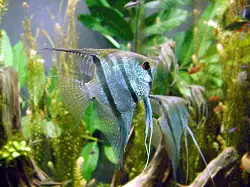
Now there are of course not enough islands to create all the species of the past and present. In biology "island" can have a wider meaning. Any geographical or food-related difference between groups can function as an island. A magnificent example is that of the cichlids in Lake Victoria (more than 500 species evolved in the last 15.000 years!), made famous in Darwin's Dreampond (1998) by Dutch biologist Tijs Goldschmidt. The publisher's book description nicely captures the (human and animal) drama involved here:
Dazzling in their variety of sizes, shapes, and colors, the cichlids (small perch-like fishes) of Lake Victoria, like the finches of the Galapagos Islands and Hawaii's Honeycreepers, have been geographically isolated long enough to undergo unusually broad speciation. These small fish form a species flock—closely related species that have descended from a common ancestor and radiated, or fanned, into different specializations—that is the most spectacular in the world, fascinating anatomists, ecologists, ethologists, and evolutionary biologists alike. The process of speciation was still under way until just recently, when the introduction of the large, predatory Nile perch so disrupted the Lake's intricate ecosystem that the glorious spectrum of cichlids has almost vanished. Darwin's Dreampond tells the evolutionary story of the extraordinary "furu" and the battlefield leading to extinction. Tijs Goldschmidt skillfully blends a masterful discussion of the principles of neo-Darwinian evolution and speciation with a history of Lake Victoria's ecosystem. The science unfolds in the context of the engaging first-person narrative of Goldschmidt's adventures and misadventures as a field researcher. An astute observer and a clear and witty writer, he warmly portrays the colors and textures of the landscapes and the lives of the local people as he interacts with them during the course of his fieldwork.[4]
Again, while all of the different species of fish lived in the same lake, they had been able to specialize into different ways of feeding, so they effectively each lives "on their own islands", metaphorically speaking. The ecology of Lake Victoria is extremely diverse, with some 16 different groups. Some fish fed on detritus, some on other fish, some on zooplankton, some on prawns, some on molluscs, and so on. Specialization has the advantage that different species can "peacefully" live together because they don't compete for the same food-source. The disadvantage of specialization is that, when your food-source goes, you go with it.
Why is Wilber not presenting us with this basic level of information about evolution and speciation?
Why is Wilber not presenting us with this basic level of information about evolution and speciation? Why is he ridiculing the whole topic beyond recognition? Especially when he doesn't have a believable alternative that even comes close to the neo-Darwinian explanations? Why use such strong language ("the neo-Darwinian explanation is absolutely inadequate") when you don't show the slightest acquaintance with the field? His (mis)understanding of speciation being the result of highly improbable simultaneous mutations in different mating animals that could live thousands of miles apart, is entirely of his own making. It overlooks the role played by the environment (which is very un-integral, if you ask me) and of the slow, step-wise pace of natural selection. Wilber makes much of the example of the immune system, but not because he is really interested in the evolutionary history of the immune system. No, he just uses it as an even stronger example in support of his faulty reasoning.
Then there's the strange comment "Now all of this is put in place, because the assumption is that there is nothing in the universe, that drives it upward." That's not much different from saying: "... because the assumption is that there is no God that has created all the different species". That is clearly a non-explanation that prevents all further investigation. In this context he brings up the Second Law of Thermodynamics, which tells us entropy or disorder and equilibrium will prevail in the end. I have dealt with this grave misunderstanding of science in other essays so won't repeat that here.[5] I will just add that, contrary to what my critics maintain, Wilber means really business when he talks about this cosmic force towards self-organization which fights back against disordering tendencies in the universe. "So that is what evolution is pushing against. And if it is not pushing against and against it, the odds are very small that it is going to overcome any of those problems." And "there is some sort of force, of upper evolutionary drive, that is behind this extraordinary capacity that evolution has produced."[6]
And what to think of this: "And of course many of the founders of evolution had something very similar in mind." Really? Care to name some names? The radicality of Darwin—which Wilber completely has missed—is that you can get to species without a Creator (or Power). All major evolutionists have subscribed to that tenet. Perhaps he has spiritual evolutionists in mind such as Teilhard de Chardin or A.N. Whitehead, but calling these "founders of evolution" (a clumsy expression anyway) is highly misleading and misinformed.
Wilber prefers to live and think in abstractions, far removed from the nitty-gritty realities of evolution. That's why he can say things like: "And if you look at evolution on the whole, that is primarily what you see." But if you would take a closer look at evolution, you would see different things, that question the very principles you have introduced to "explain" evolution in the first place. Just seeing the magnificent sequence from atoms to human beings as evidence for a Spirit-in-action is laughable, when you pretend to have anything to offer to science at all. It is an insult to science, which doesn't stop with initial feelings of mystery when confronted with nature's complexities, but starts to patiently investigate its processes (and contrary to popular misunderstanding: it doesn't diminish the wonders of nature, but adds to it).
My critics further claim that Integral Theory "transcends but includes" science, "but without the reductionism". But given the above, this is no longer tenable. Apparently, Integral Theory can only do this by misrepresenting science, instead of correctly including it. And when science is properly understood, it does away with much of the cosmic machinery Wilber has made up to account for nature's complexity.
Just postulating a cosmic, self-organizing drive towards complexity, consciousness and care, which is "vital, conscious, creative" is, shall we say, "outlandish" in the extreme?
‘entire populations simply show up’
I found another, earlier statement by Wilber on the mechanism of evolution, which is worth taking a closer look at as well, for he seems to show some understanding of the fact that speciation is primarily a collective phenomenon. In "Excerpt A: An Integral Age at the Leading Edge"[6], an excerpt from the book-in-progress "Kosmic Karma and Creativity", which was posted online back in 2002, Wilber discusses the co-arising of individual and collective phenomena.
Then he digresses to the field of evolutionary theory:
Even evolutionary sciences support this conclusion, in that they all agree on (even if they cannot explain) the fact that there are no first instances in evolution. When the first instance of a new species arises—for example, the first mammal—it never arises by itself; what first shows up is an entire population of mammals. It makes sense if you think about it. For a new species to arise, there must occur dozens of major beneficial mutations. The odds against that happening are of course astronomical; but worse, the same dozen mutations must occur in another animal of the opposite sex; and then, on the entire world-wide planet, they must find each other; and then mate, and then their offspring have to survive and mate—and the odds of all that happening are of course off the scale of the believable and even the possible. No, in some mysterious way, entire populations simply show up—and that means, the insides and outsides of the singular and the plural arrive on the scene together: the four quadrants simultaneously arise and mutually tetra-evolve, as we have been saying all along. [different types of emphasis in the original]
(How do entire populations simply show up? What "mechanism" can possible account for that? The short answer is: Eros. See the endnote on involutionary givens.(30) But whatever we decide on the "how" of it, the factual "what" of it is that the inside and the outside of the singular and the plural arrive on the scene simultaneously: the quadrants tetra-evolve.)[7]
This quote shows that Wilber has been consistent over the years in his views on evolution. We see here again the "many-simultaneous-nonlethal-mutations" argument, as well as "the-female-animal-having-to-find-the-male-animal", and so on. That scenario Wilber dismisses, again, as "off the scale of the believable and even the possible." Which it truly is, as we have seen, because it is Wilber''s fabricated version of evolution. But then he introduces another idea (apparently to resolve or clarify this awkward explanatory situation, that is a bit unclear): "in some mysterious way, entire populations simply show up." Let that sink in.
But first do notice how Wilber positions himself vis-a-vis the scientific community. "Even evolutionary sciences support this conclusion". Have they found and acknowledge a mystery Wilber is pointing to for them: "that there are no first instances in evolution"? He goes on to state that complete species, nay even complete classes like mammals, "simply show up". Scientists can't explain it, but Wilber can? Is this a clumsy way of saying that individual organisms are always members of populations and that evolution is primarily a matter of diverging populations? Does Wilber have an explanation for this? No, because he adds "in some mysterious ways entire populations simply show up". Again, we see here the dishonesty of casting doubt on the contributions of science while not being able to offer a believable alternative.
And talking about "the first mammal"... This clearly shows Wilber's incompetence when it comes to evolutionary biology. Never mind that the transition from reptiles to mammals (which represent whole classes, not just species), took millions of years to complete—as was the case in the previous transition from amphibians to reptiles. Never mind that there have been both reptile-like amphibians and mammal-like reptiles, as can be found extensively in the fossil records.
Says Wikipedia on "The Evolution of Mammals":
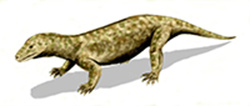 Restoration of Procynosuchus,
Restoration of Procynosuchus,
a member of the cynodont group,
which includes the ancestors of mammals
The evolution of mammals has passed through many stages since the first appearance of their synapsid ancestors in the late Carboniferous period. By the mid-Triassic, there were many synapsid species that looked like mammals. The lineage leading to today's mammals split up in the Jurassic; synapsids from this period include Dryolestes, more closely related to extant placentals and marsupials than to monotremes, as well as Ambondro, more closely related to monotremes. Later on, the eutherian and metatherian lineages separated; the metatherians are the animals more closely related to the marsupials, while the eutherians are those more closely related to the placentals. Since Juramaia, the earliest known eutherian, lived 160 million years ago in the Jurassic, this divergence must have occurred in the same period.
Of course, Wilber is not interested in these petty empirical details. He's interested in writing about his grand scheme of things, putting his opponents in a corner, and only incidentally mentioning scientific or empirical details where they fit in (but never where they contradict his scheme).
But more importantly, if mutations didn't produce new species (or even classes), then what did it, Ken? "In some mysterious ways entire populations simply show up" is just not good enough as an explanation. Yes, we should always take the collective dimension into account, but this is not a revelation of your AQAL model to the world, but basic biology 101. "The four quadrants simultaneously arise and mutually tetra-evolve" sounds very Integralese, but doesn't hold up when you carefully study the subject. As we have seen, environmental life-conditions favor some organisms above others, which predictably results in better adjusted organisms, which is made possible due to the natural variation between organisms. Shall we put an end to fabricated stories ("likely stories" if you insist) and start getting real about evolution?
Above all, stop pretending Eros offers a "actual intermediate mechanism" to clarify the processes of evolution. We don't need it, because there are better explanations available, offered by the very evolutionary science you would do well to study closer. And to my critics, please stop pretending that this is not Wilber's view on evolution, or that I need to open my third eye to see the Light.
NOTES
[1] Ken Wilber, "Taking evolution into account", 2014, Fourth Turning Conference, video #4. Reposted on integrallife.com, December 19, 2017
[2] "Taking evolution into account", (19:00-32:00),
[3] Frank Visser, "Ken Wilber's Creationism: The Invisible Supernatural Hand of Eros", March 2019, www.integralworld.net
[4] "Darwin's Dreampond: Drama in Lake Victoria", mitpress.mit.edu
[5] Frank Visser, "Entropy and Evolution, Ken Wilber's arguments for "an infinitely powerful force" behind evolution debunked", July 2014, and "Is the Universe Really Winding Up?", August 2014, www.integralworld.net
[6] In The Integral Vision (2007), an extremely popular exposition of the integral model, we find a less active idea of Spirit, in the paragraph "Is Spirit Real or Not?"—in stark contrast to the Spirit of Eros Wilber describes in this video "Taking Evolution into Account":
Sometimes it is described in terms that imply an ultimate intelligence or present Awareness or infinite Consciousness. We are not talking about a mythic, dualistic intelligence that designs things deliberately the way a watchmaker creates watches, it is an intelligence that knows a thing by being it and simultaneously bringing it forth. It is the Self of all that exists, so that knowing and being, or subject and object, are one in a nondual presence. (p. 153).
But describing Spirit merely as "all that is arising" (p. 201) does not do much in explaining empirical processes, such as cosmological or biological evolution.
[7] Ken Wilber, "Excerpt A: An Integral Age at the Leading Edge", p. 96, 2002. Reposted on www.kenwilber.com, 2006.
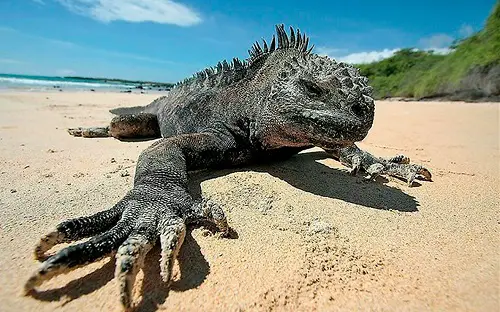
“In some mysterious ways entire populations simply show up?
Are you kidding me?”
|

 Frank Visser, graduated as a psychologist of culture and religion, founded IntegralWorld in 1997. He worked as production manager for various publishing houses and as service manager for various internet companies and lives in Amsterdam. Books: Ken Wilber: Thought as Passion (SUNY, 2003), and The Corona Conspiracy: Combatting Disinformation about the Coronavirus (Kindle, 2020).
Frank Visser, graduated as a psychologist of culture and religion, founded IntegralWorld in 1997. He worked as production manager for various publishing houses and as service manager for various internet companies and lives in Amsterdam. Books: Ken Wilber: Thought as Passion (SUNY, 2003), and The Corona Conspiracy: Combatting Disinformation about the Coronavirus (Kindle, 2020). 
